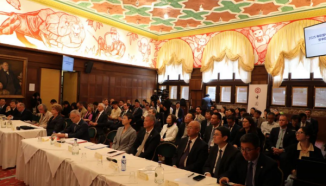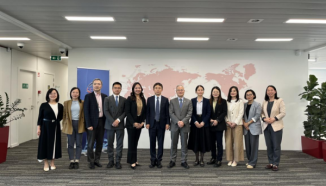CCCEU Submits Feedback to EU Draft FSR Guidelines
CCCEU Submits Feedback to EU Draft Foreign Subsidies Regulation (FSR) Guidelines
The China Chamber of Commerce to the EU (CCCEU) has submitted detailed feedback on the European Commission's draft Guidelines for the implementation of the Foreign Subsidies Regulation (FSR), published on 18 July 2025. The CCCEU appreciates the Commission's open and inclusive consultation process and recognises the importance of transparent and predictable enforcement under the Regulation.
The CCCEU's submission is structured around five overarching principles, which it considers essential to ensure fair, transparent and legally sound implementation of the FSR.
First, the Guidelines should guarantee clarity and predictability by setting out precise definitions, concrete assessment criteria, and practical examples, enabling companies to anticipate regulatory outcomes with greater certainty.
Second, they should ensure consistency with existing EU and international legal frameworks, particularly state aid, merger control, and public procurement rules, and remain fully compatible with the WTO Agreement on Subsidies and Countervailing Measures.
Third, the burden of proof must remain with the investigating authority. Unless explicitly stated in the FSR, the Commission should not shift evidentiary obligations to companies through interpretative provisions or guidance.
Fourth, the Guidelines should promote evidence-based decision-making, requiring that any finding of distortion or competitive advantage be grounded in objective and verifiable evidence, rather than presumptions, speculation, or hypothetical reasoning.
Fifth, the implementation should balance enforcement effectiveness with reasonable administrative burden. The Guidelines must not create additional obligations of economic operators beyond those prescribed by the Regulation itself, and failure to abide by the unmandated obligations should not result in adverse consequences for companies.
In its submission, the CCCEU also highlights several substantive issues that merit clarification by the Commission. The definition of "engaging in an economic activity" in the EU internal market is considered excessively broad: merely negotiating or preparing an investment should not constitute economic activity in the EU, which should commence only after a final agreement has been concluded.
The Chamber further notes that the concept of cross-subsidisation remains too vague. It should exclude trade in goods, which is already governed by anti-subsidy rules, and focus on the intent and direction of the subsidy. A proper pass-through analysis, including the arm's-length principle for transactions, is essential. The Commission shall bear the burden of proof over any alleged transfer of resources—presumptions of transfer or reversed burdens of proof to companies are unacceptable.
Each foreign subsidy should be assessed individually, with a clear causal link established between the subsidy and any alleged negative effect on competition. "Deterrence effects" must be based on positive evidence rather than speculation.
Regarding the balancing test, the CCCEU notes that the standard of proof for identifying "positive effects" remains unclear. Both actual and potential positive effects—such as contributions to sustainability, innovation, and employment—should be considered. The requirement that positive effects must be "relevant to the Union" is, in the CCCEU's view, an unnecessary and possibly unlawful limitation. The Commission should provide a more concrete methodology and take an active role in assessing positive effects, while also granting companies adequate opportunity to submit supporting evidence.
The CCCEU also cautions that the ex officio power to request notification should remain within the strict limits of the Regulation. Extending notification obligations to subcontractors or suppliers would contradict the FSR's text. The power to request notifications of transactions below thresholds should be exercised sparingly and only on the basis of positive evidence, not suspicion or unsubstantiated complaints. Moreover, economic security considerations fall outside the scope of the FSR and should not be invoked under these Guidelines.
Quote from CCCEU Secretary General Fang Dongkui:
"The CCCEU welcomes the European Commission's continued engagement with stakeholders on the FSR. We hope the final Guidelines will provide greater predictability and ensure that enforcement remains proportionate and evidence-based. Chinese companies are committed to contributing to Europe's green transition, innovation, and employment. We trust that the EU will take into full account the views of businesses operating in Europe to ensure a transparent and non-discriminatory environment for all."
The CCCEU urges the Commission to incorporate these recommendations into the final Guidelines to ensure that the FSR implementation achieves its stated objective of safeguarding a level playing field, while maintaining proportionality, legal certainty, and respecting international trade and investment rules and principles.

 Login
Login Login
Login 2025 China-EU Business Forum Draws 100+ Companies
2025 China-EU Business Forum Draws 100+ Companies CCCEU Holds Automotive Working Group Meeting to Discuss Developmentand Compliance Issues in Europe
CCCEU Holds Automotive Working Group Meeting to Discuss Developmentand Compliance Issues in Europe



